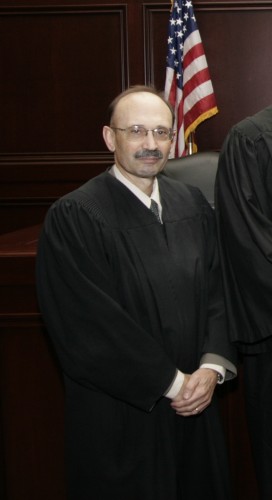
Federal Judge Ronald Guzman says the recession and government budget cuts have left judges overburdened, making it difficult to devote enough time to each case.
“One tenth of 1 percent of the government budget is for maintaining this branch,” said Guzman. “We are now doing more work with a less amount of people, which means the amount of time to dedicate to each case is decreased.”
Guzman, 62, recently spoke at Columbia College Chicago.
Guzman’s current workload includes approximately 310 cases, about 100 more cases than he had only four years ago. Guzman said the federal court in Chicago has lost four judges.
Guzman has remained in the courts for over 20 years. After graduating from New York University law school, he pursued private practices for 10 years before working for assistant’s states attorney for six years. Guzman was then appointed to the federal bench in 1999 by former President Bill Clinton.
He said his cases now are often delayed because of the shortage of judges. “Any amount [of cases] over 210 is difficult. The numbers are too oppressive,” said Guzman.
Guzman’s cases during the past year have mostly involved labor law, criminal death penalty and government policies. He said he often leaves his home at 6 a.m. and doesn’t get home until 6 p.m. at night.
He said many of his recent cases have involved fraudulent hedge funds, like the one set up in New York by Bernard Madoff. In these schemes, victims invest their money, which is stolen by the fund manager, who promises huge profits. Often the managers attract as many investors possible and use their payments to minimally pay off their investors.
Elderly victims sometimes lose their life savings to such scam artists, Guzman said.
“I get a lot of heartbreaking letters,” said Guzman. “It’s hard to explain why I can’t get them their money.”
Although such schemes can be extremely profitable, they are possible to maintain only if the flow of investors remains high. Because of this delicate balance of traffic, many fraudulent hedge fund managers often find themselves in court.
“Oh yeah, they get caught here,” said Guzman in response to Ponzi scheme offenders. “It’s a never-ending interesting set of cases, they’re never just boring.”
Guzman said although many of the culprits are caught, many investors never see their money returned. He said many of the investments invested in other countries such as Mexico, making it much more complicated to trace exactly where the money has gone.
The courts recently diminished staff hinders investigations, Guzman said. The cuts have forced Guzman and other judges to hire outside attorneys to find missing investments. The attorneys are paid by the victims.
“People are losing their life savings,” said Guzman. “I’ve had a case where they’ve taken $1 million or so.”
Guzman said media coverage may help increase the budget, but until then federal courts work harder than ever to keep a cap on federal crimes.













Be First to Comment